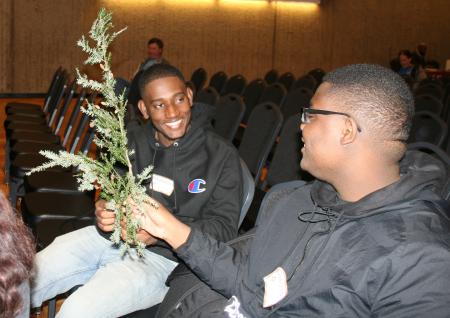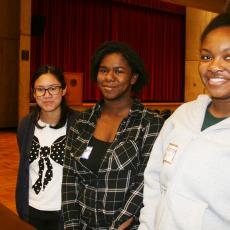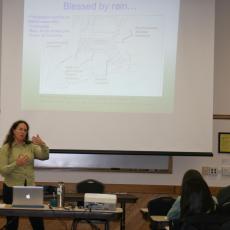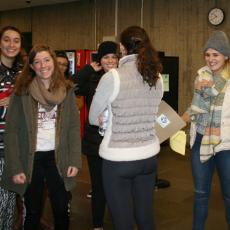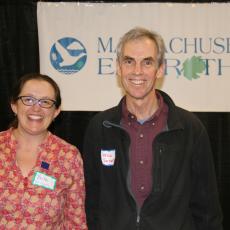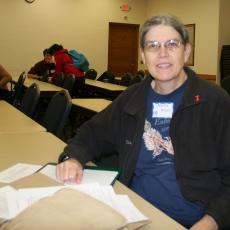Your future conservation commissioner may already be an active member of an Envirothon team in your local high school. Your current commissioner may have been one back in high school. For 30 years, enthusiastic students and their coaches throughout Massachusetts have gathered each fall to get ready for the spring Massachusetts Envirothon competition. While Envirothon’s annual topic changes from year to year, the support for these young people to understand the environment around them has not.
In November, over 200 students and 31 coaches from 19 teams met at the University of Massachusetts Amherst campus for a day of workshops, field trips, and discussions with UMass faculty and conservation leaders from across the state. One student remarked “I would recommend this program because it is fun and informative. It opens your eyes about what you can do and lets you be aware of current issues our towns and cities all face regarding water quality and availability.”
According to Will Snyder, who, as a UMass Extension educator, serves as Committee Chair for the Massachusetts Envirothon, this year’s topic asks the question, “Can our communities work with the natural infrastructure of our watersheds toward sustainable development, even as climate change accelerates?” Although he immediately answers his own question with a resounding “yes,” the students will have some hard work ahead to get to this conclusion. They will need to map out the boundaries of their community watershed and discover sources of surface water and groundwater. They will need to research the source of their drinking water, where it goes and what it carries when it goes down the drain. Discussions with managers of wastewater treatment facilities and community budget leaders are on their agendas. Meetings will take place with town engineers, natural resource managers and others to understand the problems they must address and solutions they offer. Finally, they will gain insight into the ways in which climate change will affect water resources in their communities for the next 50 years. By May of next year, Envirothon teams will assess water infrastructure resources and needs, be able to identify important partnering opportunities and make specific recommendations for action. In fact, team members may know more about water resources in their towns and cities than some of their elected officials.
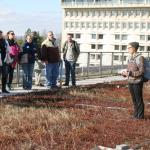 At the recent UMass workshop, students met with an impressive slate of professors and environmental leaders who introduced them to several interrelated topics, one of which was the challenge of storm water management. One foray out onto the campus found them clambering atop the recently-built Integrated Learning Center building to explore its green roof. They looked at the ways in which it was designed, constructed and is maintained to control and absorb 90% of stormwater it absorbs during rain episodes. Later, some walked across campus to meet with hydrology experts at the state-of-the-art John W. Olver Design Building and learn about the function of its innovative rain gardens to control and treat stormwater from the roof and surrounding landscapes.
At the recent UMass workshop, students met with an impressive slate of professors and environmental leaders who introduced them to several interrelated topics, one of which was the challenge of storm water management. One foray out onto the campus found them clambering atop the recently-built Integrated Learning Center building to explore its green roof. They looked at the ways in which it was designed, constructed and is maintained to control and absorb 90% of stormwater it absorbs during rain episodes. Later, some walked across campus to meet with hydrology experts at the state-of-the-art John W. Olver Design Building and learn about the function of its innovative rain gardens to control and treat stormwater from the roof and surrounding landscapes.
“Getting kids interested in protecting the environment is the most exciting part,” says Martha Moore, coach of Reading’s Envirothon team. She has been fostering her teams for six years with 10 participants in this year’s group. Her fellow coach Gary Baldwin is so new to this year’s team, he did not realize his official title was “coach,” until his arrival at the workshop, but he is rolling up his sleeves and diving right in. Baldwin said, “I have heard really good things about the Envirothon from kids and past teachers. Last year’s coach moved, but I was inspired to keep it going.” He is coaching an all-girls team from Holyoke High School.
The North American Envirothon program, hosted in every state and Canadian province, emphasizes hands-on, team-oriented problem solving and community involvement to prepare young people for environmental careers and active citizenship. Environmentally knowledgeable volunteers are always needed. If you are interested in becoming involved with the Massachusetts efforts, visit the Massachusetts Environthon website.
Extension’s Envirothon Chairman Snyder says, “The best hope for the future comes from engaged, scientifically-literate citizens who care about their communities and the environment. The Envirothon is more than just a competition about environmental knowledge. It is a gathering of the environmental community of Massachusetts. It aims to prepare the next generation for the stewardship work that needs to be done.”
